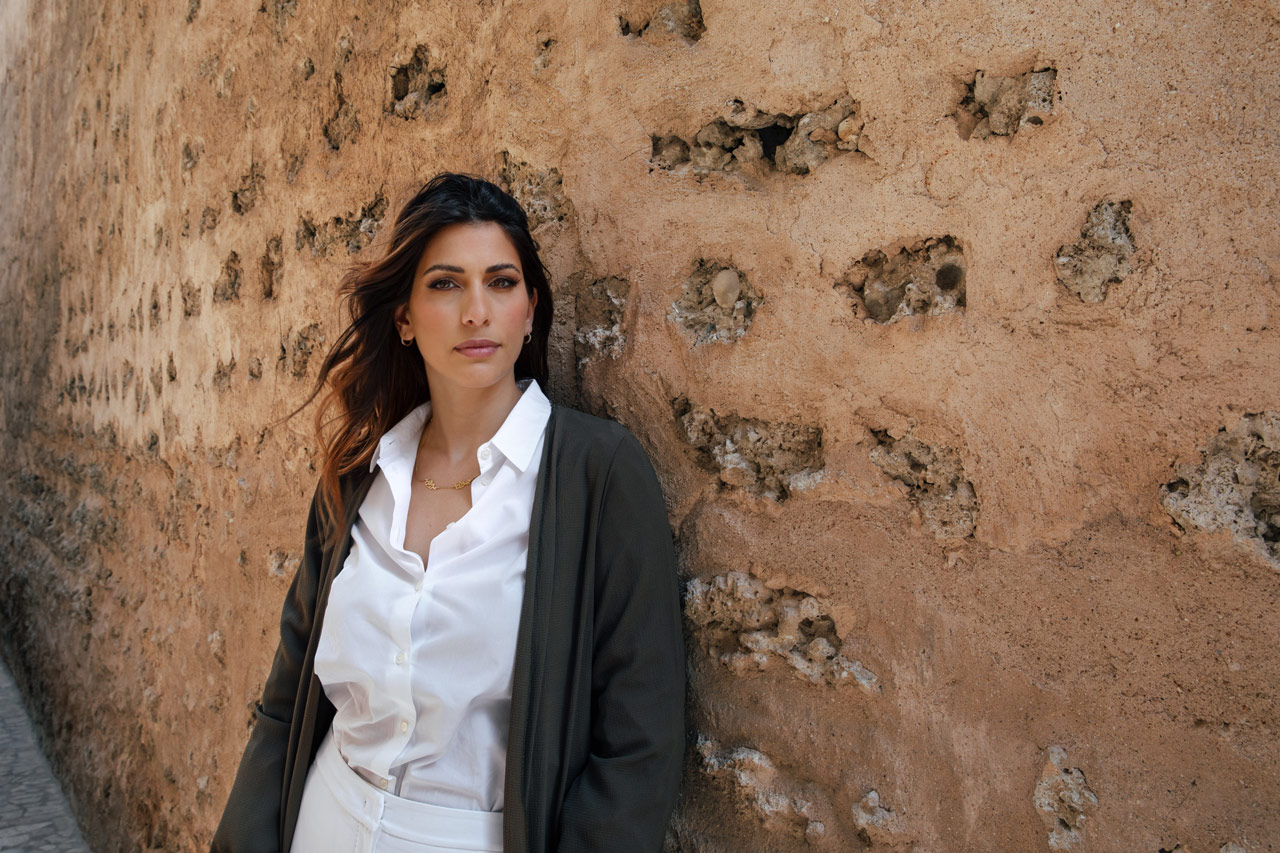Featured in this issue is Jwana Hamdan, the founder of the Italian outdoor furniture brand with the same name. JH is the first outdoor design brand where Italian design know-how meets a cosmopolitan cultural heritage of Middle Eastern inspiration.
1. Why did you decide to create your own line of distinctive outdoor furniture?
I grew up between Como and Milan, a territory renowned for two important traditions, the textile industry, from embroidery to the production of silks and fabrics for high fashion, and the furniture industry both classic and contemporary. I embarked on this entrepreneurial path because, thanks to the activities of my family, I had the chance to live in daily contact with a network of companies and manufacturers with a high level of know-how: this has allowed me to understand all the production processes and behind the scenes of a Made in Italy product. The creative path is linked to a personal phase of research of my identity and roots; This collection is the meeting of two worlds that belong to me and that represent me, on the one hand Italy, for the high quality and attention to detail, on the other the values and traditions that are the basis of my cultural heritage.
2. “The Wandering Majlis” is the brand’s first collection debuted at Salone del Mobile this year. What are its components?
The Wandering Majlis represents the symbolic journey of a Majlis, a welcoming space open to everyone, characterized by an essential furniture, consisting of lounge seats, carpets, tables and lanterns. The seats are modular and for each element, accessory and complement you can create numerous combinations of fabrics, finishes and colors, to create “outdoor living rooms” every time unique and potentially suitable for any type of environment – From the desert to the boat, the beach, the terrace and the garden…
3. What challenges have you faced, and what successes have you achieved so far in creating the brand?
This is undoubtedly an industry with very high “entry barriers”. It is not just a matter of investment, to be able to create your own network of suppliers and at the same time your commercial network is above all essential to have a project with a clear idea and a long-term vision. One of the most difficult challenges in my opinion is to remain consistent with the brand identity and create an offer that is perceived as unique within the industry. As for the first feedback, the positive reaction and compliments received from professionals and industry leaders at the official launch of the first collection were very important.
4. What made you decide to partner with Purity in the GCC?
Purity has an excellent reputation in the region and represents brands that are among the best excellence of Made in Italy design. The search for details and the culture of beauty are perceived as soon as you enter the showroom in Jumeirah, as well as having a very passionate and prepared team. Our collaboration is based on a relationship of trust and mutual esteem.
5. What do you expect the brand to look like in a few years?
I expect to have an expanded product range and a new textile project, recognizable elements, in continuity with the philosophy and vision of the brand. Moreover, I imagine a direct involvement in the territories where we will be represented, through collaborations with local artists and designers, events and activities aimed at promoting values such as socialization, creativity and self expression.
6. In what ways does the brand commit to sustainability?
Creating a brand today does not mean just creating a line of products, but building a world of values and consistency. Sustainability concerns the materials used but also less visible aspects, such as the choice of suppliers and the innovation techniques introduced in the production phases. Sustainability in our sector is a primary commitment and must be synonymous with quality and durability.
7. What is the origin or inspiration behind the textiles, patterns and colors created for “The wandering majlis”?
The Wandering Majlis Textile Project is inspired by the iconographic tradition of Arab countries, such as the use of symmetries and geometric designs, combined with each other in a creative and harmonious way, the colors symbol of the Bedouin tradition such as red and the motifs present in the Al-Sadu weaving, details that are want to pay tribute to the textile art of local populations.
8. Can the pieces from the collection be customized?
The wide range of colors and patterns, the freedom to mix them together and the modularity of the seats allows the creation of elements each time unique and that easily adapt to the space and context. It is possible to furnish areas with customized products – an example are the cushions for the sunken seats – but also to insert new colors for a particular project.
9. How would you like the brand to be perceived in the GCC?
I would like it to be perceived for what it really is, a high quality Italian product, which wants to promote an essential but also sophisticated outdoor lifestyle, and represent the values of hospitality and warmth linked to the culture and tradition of Arab countries.
10. Do you have a favorite piece from the collection? And why?
It is a difficult choice but I am very attached to Majlis, the lounge seat in the floor version because, although it is not raised on a structure, it has been designed to have the comfort of a real outdoor sofa: Its curved lines and generous dimensions also encompass the entire philosophy of the collection.
11. what has been the most exciting part for you in creating your brand?
The whole creative process is exciting, from product development, material research, prototyping, up to the communication and marketing activities. This project is the result of a great team effort, which includes all suppliers, artisans and different collaborators, each specialized in its own field. The human aspect, made of listening and sharing, open comparison and respect for the opinions of others is the real intangible value that is an integral part of each product.


